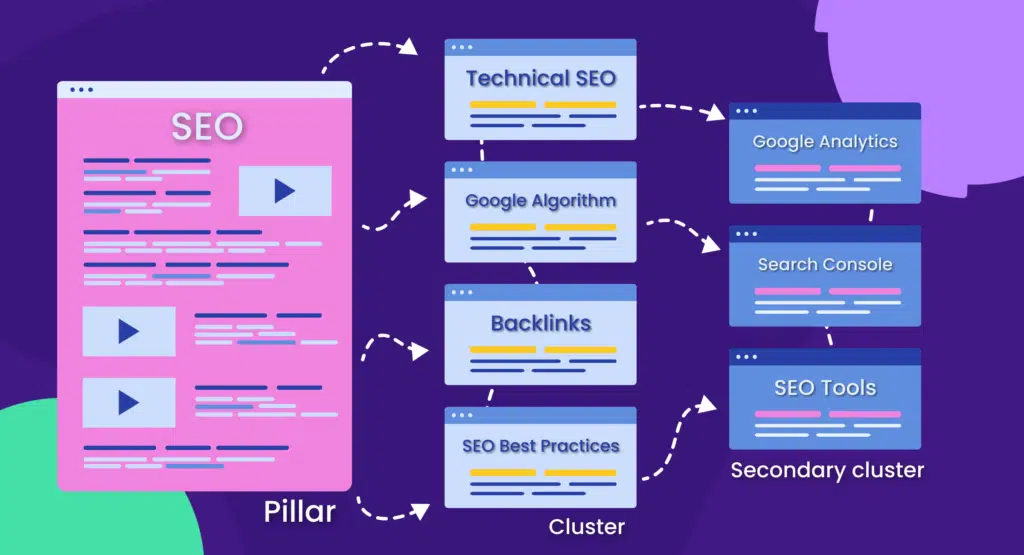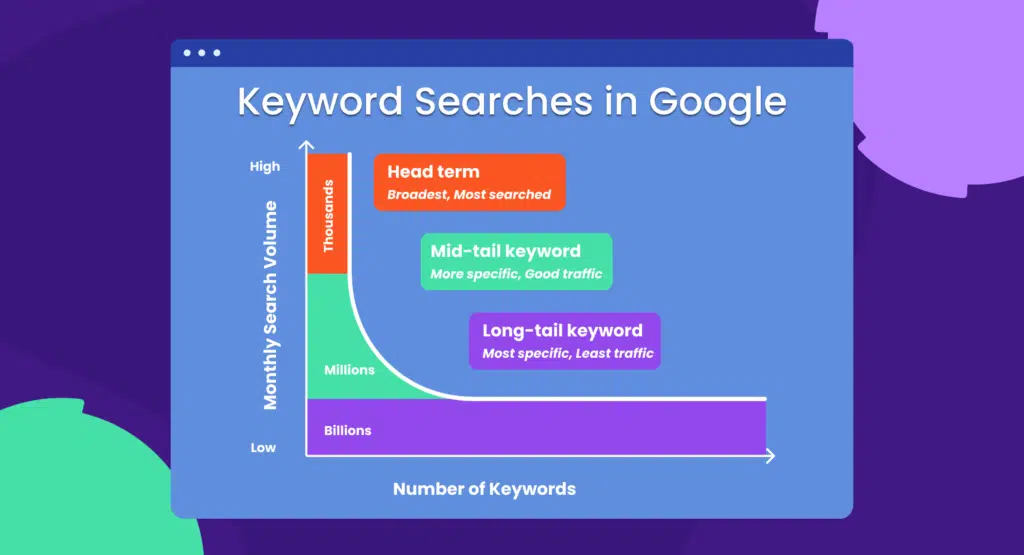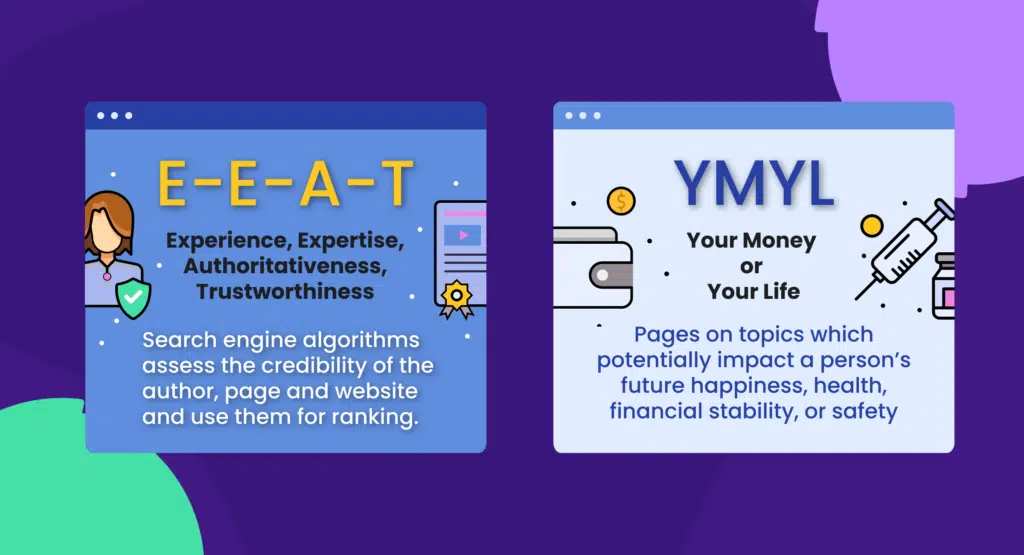
The future of SEO is an exciting fusion of AI, user-centric strategies, and multi-channel optimization. As search engines evolve and prioritize E-E-A-T, personalization, and conversational search, SEO professionals must adapt and innovate to stay competitive.
What are some initial things you can do to evolve your skill set accordingly? Embracing AI-powered tools and focusing on delivering exceptional user experiences will be key factors to focus on.
In this post, we’ll explore current SEO trends and consider how AI is affecting how we’ll all create and optimize content in the future.
What Are the Current Trends in SEO?
I’ve compiled a list of what I think is shaping the SEO industry at the moment, and will continue to affect search in the near future.
These developments are the ones that SEO professionals and businesses need to pay attention to if they want to stay ahead of the game.
Topical Authority
Demonstrating expertise on a specific topic, known as topical authority, is becoming increasingly important. Topical authority means becoming your niche’s go-to source for information by creating content that comprehensively covers your subject matter.
Focus on developing high-quality, expert-level content to build an extensive catalog of content that explores related topics and subtopics. You also need to implement a site architecture that makes it easy for humans and search engines to find relevant content across your website.
For example, if you run a website about SEO, establishing topical authority would involve creating content pillars, clusters, and secondary clusters related to technical SEO, backlinks, tools, etc.

To identify core topics in your niche, explore Semrush’s Topic Research Tool. This tool provides insights into your main subject’s most relevant and popular topics.

The Shift Toward Answer Engine Optimization
With the growing popularity of chatbots and smart assistants, users are increasingly seeking immediate answers. They often don’t want to click through to a web page when they land on a SERP. That’s why Answer Engine Optimization (AEO) is becoming a crucial aspect of SEO.
AEO involves optimizing content for answer engines (AI-powered technologies that synthesize information to provide conversational responses to user queries).
Examples of answer engines include ChatGPT and Microsoft’s Bing chatbot.
To prepare for these changes, focus on developing an AEO strategy alongside your traditional SEO efforts. Prioritize creating concise, clear, and direct content that can be easily processed by AI and machine learning algorithms and cited within AI-generated responses.
One effective strategy is to implement a robust Q&A-style format in your content. Include FAQs in your articles and structure long-form content around key questions that users might ask in a conversational search.
With Semrush’s Keyword Magic Tool, you can identify common questions and long-tail keywords related to your business, and discover the most relevant questions to address in your content.

Using tools like this while creating content can ensure your website is well-positioned to provide answers to a variety of user queries through answer engines.
The Importance of Visual and Voice Search
The trends in visual and voice search fit in with AEO. Visual search enables users to search using images, and voice search allows users to ask questions using natural language.
To optimize for visual search, use high-quality, relevant images with descriptive file names, alt text, and captions. This helps search engines understand the content of your images and improves your chances of appearing in visual search results.
For voice search, prioritize creating content that answers common questions in a concise and conversational way. Use long-tail keywords and natural language phrases that match how people speak when asking questions.
Google’s Continued Focus on Е-Е-А-Т
Google’s E-E-A-T (Experience, Expertise, Authoritativeness, Trustworthiness) guidelines are a critical factor in the algorithm. These principles emphasize the importance of creating high-quality, reliable content demonstrating your knowledge and credibility in your field.
For example, if you run a medical website (a YMYL topic), your content should be written or reviewed by qualified medical professionals to ensure accuracy and trustworthiness.

To improve your E-E-A-T, focus on:
- Creating content written by qualified experts in your niche.
- Building your online reputation through positive reviews, mentions, and backlinks from reputable sources.
- Ensuring your website has a clear purpose and provides value to users.
- Implementing strict editorial standards and fact-checking processes.
Prioritizing E-E-A-T in your SEO strategy will improve your search engine rankings, build trust with your audience, and establish you as a reliable source of information in your industry.
The Rise of Zero-Click Searches
Zero-click searches, where users don’t click on any of the displayed results on search engine results pages, are becoming increasingly common. The Semrush State of Search report revealed that 57% of mobile and approximately 25% of desktop searches result in no clicks on organic or paid results.
Users may not click on a result for a number of different reasons. For instance, when searching for “best Italian restaurants near me,” Google often provides the necessary information, such as location, contact details, and business hours, directly in the local pack or map pack. This satisfies the user’s intent without requiring them to click on a link.
To minimize the impact of zero-click searches, adjust your strategy to focus on securing featured snippets for queries that don’t typically result in clicks. Targeting these keywords may not directly lead to increased website traffic, but securing the featured snippet (known as “position zero”) can be beneficial because it boosts brand recognition and increases your chances of getting clicks from users who explore the results further.
When you’re a recognized thought leader in your space, users are more likely to click on your site in future searches or visit your site directly for answers.
Video Content for SEO
People are consuming more videos than ever, and video content is becoming increasingly important for SEO. Wyzowl’s Video Marketing Statistics 2024 report indicates that 89% of users want to see more videos from brands.
But don’t jump in without a plan. Develop a solid video SEO strategy before you pick up the camera. A sound strategy will help you create videos that stand out so your audience views, values, and keeps coming back for more of your content.
To enhance discoverability, perform YouTube keyword research for your video titles, descriptions, and tags.

Semrush’s Keyword Analytics for YouTube app is a helpful tool for identifying popular search terms. It helps you understand what your prospects are searching for so you can create content that matches their preferences.
Multi-Channel Optimization
Users now consume content across multiple channels, so you must provide a seamless and engaging experience across platforms.
Multi-channel optimization involves optimizing your content for different platforms and devices, including:
- Search engines
- Social media
- Mobile apps
To optimize for multiple channels, focus on creating high-quality, shareable content tailored to each platform’s requirements and best practices. This may involve adjusting your content’s format, length, or style to suit different channels.
Analyze the performance of your content across different channels regularly using tools like Google Analytics. This will help you identify which channels are most effective for reaching your target audience and driving engagement. Use the data you gather to continually refine your multi-channel optimization strategy.
How Will AI Affect SEO?
The emergence of ChatGPT and other AI-powered tools is raising this monumental question for SEO pros and business owners.
These innovative applications present new challenges and uncertainties, but instead of going against the tide, you’ll need to embrace and adapt this new tech, even as it shifts some of the rules of what we do.
Here are a few things I’m seeing and some tips on preparing for the changes.
AI Overviews and More
Google’s AI Overviews are poised to revolutionize user interactions with search engines. That means it’s going to change your content optimization strategies, too.
AI Overviews provide AI-generated results at the top of SERPs, along with relevant links and prompts for further exploration.

As the artificial intelligence market continues to grow, with projections reaching nearly two trillion U.S. dollars by 2030, businesses are heavily investing in this technology.
While it’s too early to establish definitive strategies for optimizing content for AI overviews, focusing on content that directly answers user queries and incorporates expert analysis, direct language, topical authority, and novel information may improve visibility.
However, it’s crucial to maintain traditional SEO best practices, as SERPs still include conventional search results. As this evolution is in its early stages, the extent to which users will rely on AI-generated results remains uncertain, and many may still click through to regular search results.
Content Generation
You’ve seen them everywhere by now, and it’s clear that AI-powered content generation tools are becoming increasingly popular in the SEO industry.
Generative AI offers the potential to streamline the content creation process, but human oversight is essential.
Before using ChatGPT, Claude, or other AI-powered bots, invest time in keyword research, audience analysis, and topic ideation. This groundwork will help guide the AI tool toward generating content that aligns with search intent, addresses the target audience’s needs, and incorporates relevant keywords naturally.
Avoiding generic, robotic-sounding AI generated content is also critical. You don’t want to publish generative AI output word-for-word. You’ll still need to edit and fact-check to maintain content quality, ensure accuracy, and incorporate a unique brand voice that resonates with readers.
Personalization
AI-driven personalization is set to reshape the SEO domain by tailoring search experiences and content delivery to individual user preferences.
As search engines leverage AI to better understand user behavior and intent, they can serve content in formats that align with each user’s preferred mode of consumption, whether that’s video, voice, text, or images.
For example, let’s say a user frequently interacts with cooking videos. AI-powered search engines can recognize this preference and prioritize video results from reputable cooking websites when this user searches for recipes.
On the other hand, a user who often reads long-form articles about financial advice might be served more text-based content from authoritative finance websites when searching for investment tips.
This personalized approach increases user engagement and presents new opportunities for SEO professionals to optimize content across channels. Becoming skilled in the personalization game ensures your message reaches the right audience at the right time, in the format they prefer.
Predictive Analysis
Integrating AI in SEO opens up new avenues for predictive analysis, which means businesses can gain deeper insights into user behavior and interactions with their online presence.
By leveraging AI tools, you’ll be able to anticipate user needs, preferences, and future trends. These insights can inform your keyword targeting, content creation strategies, and overall SEO decision-making. In the future of SEO with AI, we’ll see businesses empowered to deliver highly relevant and engaging experiences for their target audiences.
AI-driven predictive analysis can also help identify potential opportunities and risks. When you analyze large data sets from search engines, social media, and website analytics, you can uncover hidden patterns and correlations you may not be able to spot with manual analysis.
With AI in your arsenal, SEO pros will be able to predict search trends, shifts in consumer behavior, and emerging market opportunities with uncanny accuracy. These insights are a secret weapon that helps you make smarter, data-driven decisions.
Data will help you fine-tune your strategies, put your resources where they’ll have the most impact, and seize new growth opportunities while sidestepping potential pitfalls.
Automation of SEO Tasks
AI-driven SEO automation goes beyond just content generation. It can simplify and streamline a wide range of SEO tasks.
AI tools can handle keyword research, analysis, technical audits, backlink management, and more. Setting up processes with AI can save you considerable time and effort.
But human oversight is still essential, even with automation. It is crucial to ensure that AI-generated output is accurate, relevant, and useful.
The key is finding the sweet spot between AI automation and human expertise. When SEO pros get this balance right, they can be more productive than ever, focusing on high-value, strategic work that really moves the needle for their business and their clients.
Will SEO Exist in 5 Years?
While I can’t answer the question on everyone’s mind with any certainty, I can make some educated predictions. I’m also tuned in to what other SEO experts are saying.
One possibility is that search will become increasingly skewed towards video and voice-based search queries. With the rapid advancement of AI-powered assistants and the growing popularity of smart speakers, users may increasingly rely on conversational interfaces to find the information they need.
Another potential scenario is that search engines will become even more intelligent, leveraging AI and machine learning to provide users with hyper-personalized results.
Alternatively, the future of SEO may lie in a more decentralized search ecosystem, where users rely on various platforms and applications to find information, rather than a single dominant search engine. This fragmentation could require SEO professionals to adopt a more holistic approach and optimize content for multiple channels and platforms.
Regardless of which scenarios unfold, the world of SEO is changing fast, and keeping up with everything requires a commitment to continuous learning and adaptation.
One of the best ways to stay informed and connected is by joining a SEO community like Traffic Think Tank Academy. This vibrant group of like-minded professionals offers a wealth of resources, insights, and support. Our mission is to help members stay up-to-date with the latest search news and practices.
Learn more about joining TTT Academy so you’ll be well-prepared to navigate the future of SEO, no matter what challenges and opportunities it may bring.
Semrush
- Semrush – Best overall SEO functionality
- Google Search Console – Best free (partial) data from Google
- Advanced Web Ranking – Best for reporting
- SERPWatcher by Mangools – Best for bloggers and small teams
- Ahrefs – Best for keyword analysis
- SEO PowerSuite – Best affordable option
- SEO Monitor – Best for forecasting
- Local Viking – Best for local SEO map tracking
- Nozzle – Best for data visualization
- ProRankTracker – Best for agencies and SEO professionals